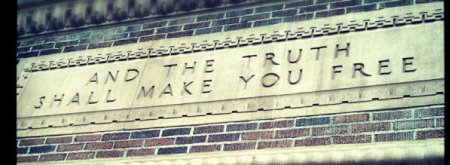What is Truth? (on the Nature and Importance of Truth Today)
Have you ever been told that truth is relative? That it's all based on language and context? That it's only what a culture believes to be real? Douglas Groothuis tackles these issues and more as he examines the question, "What is truth?".
Truth is so obscured nowadays, and lies so well established, that unless we love the truth, we shall never recognize it. Blaise Pascal
Staring Truth in the Face
"Everyone on the side of truth listens to me." Jesus Christ made this statement after Pontius Pilate had interrogated him prior to the crucifixion (John 18:37, NIV). Pilate then famously replied, "What is truth?" and left the scene.
As philosopher Francis Bacon wrote in his essay 'On Truth':
"What is truth?" said jesting Pilate; and would not stay for an answer.
Although Jesus made no reply to Pilate, Christians affirm that Pilate was staring truth in the face, for Jesus had earlier said to his disciple Thomas, "I am the way and the truth and the life" (John 14:6).
This historic exchange raises the perennial question of the very nature of truth itself. What does it mean for a statement to be true? Or, to put it another way: What does it take for a statement to achieve truthfulness?
This has been a subject of much debate in postmodernist circles, where the traditional view of truth as objective and knowable is no longer accepted. Many even outside of academic discussions may be as cynical about truth as Pilate. "What is truth?" they smirk, without waiting for an answer. Postmodernist philosopher Richard Rorty claimed that truth is what his colleagues let him get away with.[1] Unless we are clear about the notion of truth, any claim to truth – religious or otherwise – will perplex more than enlighten.
Before attempting to determine which claims are true, we need to understand the nature of truth itself. I will briefly argue for the correspondence view of truth and then pit it against two of its main rivals, relativism and pragmatism.
Truth and Correspondence
The correspondence view of truth, held by the vast majority of philosophers and theologians throughout history, holds that any declarative statement is true if and only if it corresponds to or agrees with factual reality, with the way things are. The statement, "The desk in my study is brown", is true only if there is, in fact, a brown desk in my study. If indeed there is a brown desk in my study, then the statement, "there is no brown desk in my study", is false because it fails to correspond to any objective state of affairs.
Minds may recognize this truth, but minds do not create this truth
The titanic statement, "Jesus is Lord of the universe", is either true or false. It is not both true and false; it is not neither true nor false. This statement either honors reality or it does not; it mirrors the facts or it does not. The Christian claims that this statement is true apart from anyone's opinion (see Romans 3:4). In other words, it has a mind-independent reality. Minds may recognize this truth, but minds do not create this truth. This is because truth is a quality of some statements and not of others. It is not a matter of subjective feeling, majority vote or cultural fashion. The statement, "The world is spherical", was true even when the vast majority of earthlings took their habitat to be flat.
The correspondence view of truth entails that declarative statements are subject to various kinds of verification and falsification. This concerns the area of epistemology, or the study of how we acquire and defend knowledge claims.[2] A statement can be proven false if it can be shown to disagree with objective reality. The photographs from outer space depicting the earth as a blue orb (along with prior evidence) falsified flat-earth claims. Certainly, not all falsification is as straightforward as this; but if statements are true or false by virtue of their relationship to what they attempt to describe, this makes possible the marshaling of evidence for their veracity or falsity.[3]
Therefore, Christians – who historically have affirmed the correspondence view of truth – hold that there are good historical reasons to believe that Jesus Christ rose from the dead in space-time history, thus vindicating His divine authority (see Romans 1:4; 1 Corinthians 15:1-11).[4] The Apostle Paul adamantly affirms this view:
And if Christ has not been raised, our preaching is useless and so is your faith. More than that, we are then found to be false witnesses about God, for we have testified about God that he raised Christ from the dead. (1 Corinthians 15:14-15)
Without the correspondence view of truth, these resounding affirmations ring hollow. Christianity cannot live and thrive without it.
Postmodernism: Truth in Doubt
Today this view of truth is being brought into doubt. Postmodernist philosophers claim that the quest for objective truth asserted through language is part of the discredited project of modernism, an over-confident approach to knowledge stemming from enlightenment rationalism.[5] Therefore, statements about scientific facts, religious claims or moral principles cannot refer to objective states of affairs. On the contrary, language is constructed through communities, and it cannot move beyond its own context and refer to realities outside itself.
A thorough analysis of the postmodernist assault on truth would take us beyond the limits of this article,[6] but a basic critique of this notion of truth is that this view is self-refuting. If all language fails to describe objective conditions, due to its immersion in various cultures, then any language used to describe this universal immersion would be subject to the limitations of its context. And that would mean that any and all language fails to describe the universal limitations of all languages. This kind of statement, therefore, discredits itself. For all its protests about the illegitimacies of "metanarratives" (worldviews), postmodernism offers a metanarrative of its own – one that cannot be true given its own precepts.[7]
Moreover, the notion that objective truth is unknowable entails that a relativistic and/or pragmatic view of truth be put in the place of a correspondence view. I contend that both of these views – that is, relativism and pragmatism – are logically defective and unworthy of belief.
Relativism: Who's to Say?
Relativism comes in various shapes and sizes, but its salient claim is that the truth of a statement depends on the views of persons or cultures, not on whether statements correspond to objective reality. To say a statement is true is simply to say that a person or culture believes it to be true. Hence the popular refrain, "Well, that's true for you."
According to this view, one person can say "Jesus is Lord" and another can say "Allah is Lord", and both statements will be true, if they accurately express the sentiments of the speakers. This view seems to advance tolerance and civility, but it does so at the expense of logic, meaning and truth. That price is too high.
If I say "Jesus is Lord" and you say "Allah is Lord", both statements cannot be objectively true because they describe mutually exclusive realities. Jesus is known by Christians as God made flesh (John 1:14), while Muslims deny that Allah incarnates.[8] So, if "Lord" means a position of unrivaled metaphysical and spiritual supremacy, then Jesus and Allah cannot both be Lord because "Jesus" and "Allah" are not two words that mean the same thing.
If we mean to say that I believe in Jesus and you believe in Allah, there is no logical contradiction, since subjective beliefs cannot contradict each other; that is, it may be true that I subjectively believe X and you subjectively believe non-X. However, X and non-X themselves cannot both be objectively true. When dealing with divergent claims to objective truth, contradictions emerge frequently.[9] A 2002 survey by Barna Research found that 44 percent of Americans contend that "the Bible, the Koran and the Book of Mormon are all different expressions of the same spiritual truths." This reveals an untrue view of truth.
Applied to medicine or science, this sort of relativistic attitude would be deemed ridiculous. Medical doctors have good reason not to bleed their patients, as was commonly done for centuries. This is because we objectively know that bleeding does not help patients, whatever the social consensus may have been at an earlier time.
Truth is what corresponds to reality
Unlike the correspondence view of truth, which seeks objective support for the truth or falsity of statements (whenever possible), relativism offers no means of verifying or falsifying any belief apart from discerning whether one holds the belief or whether a particular culture tends to affirm certain things.
The Weakness of Pragmatism
A pragmatic view of truth also rejects the objectivity of truth. This view holds that a belief is true only if it works for a particular person. Therefore, Christianity may be "true for me" if it helps me, but false for another if it doesn't seem to help her. But this view confuses usefulness with verity.
Think of a person who chronically mismanages his money and is very unsuccessful. A few hundred dollars are stolen from him without his knowledge. Yet he thinks he has misplaced the money and says to himself, "That's the last straw. I've got to get my life in order!" After this, he becomes successful through hard work and diligence. Yet his belief that he lost the money, however beneficial, was not true because it did not conform to the reality that the money was stolen. This shows that the truth-value of a belief is different from its use-value.[10]
Truth Defined
So, "What is truth?" Truth is what corresponds to reality. When this is established, we can move on to considering which particular statements are true and reasonable and which are not. Unlike Pilate, we can stay and listen to what Jesus has to say to us. He alone has the words of eternal life (John 6:68).
Notes:
[1] This is a paraphrase, but represents his views truly. See Richard Rorty, Philosophy and the Mirror of Nature (New York: Princeton University Press, 1979), p.176.
[2] For a superb introduction to epistemology in relation to postmodernism, see R. Douglas Geivett, 'Is God a Story? Postmodernity and the Task of Theology', in Myron Penner, ed., Christianity and the Postmodern Turn (Grand Rapids, MI: Brazos Press, 2005), pp.37-52.
[3] For an introduction to the role of logic in the testing of worldviews, see Ronald Nash, World-Views in Conflict: Choosing Christianity in a World of Ideas (Grand Rapids, MI: Zondervan Publishing House, 1992), especially pp.54-106.
[4] See J.P. Moreland, Scaling the Secular City (Grand Rapids, Baker Books, 1987), Chapter 6; N.T. Wright, The Resurrection of the Son of God (Fortress, 2003).
[5] See Douglas Groothuis, Truth Decay (Downers Grove, IL: InterVarsity Press, 2000), Chapter 2.
[6] See Groothuis, Truth Decay.
[7] See James Sire, The Universe Next Door, 4th ed. (Downers Grove, IL: InterVarsity Press, 2004), p.237.
[8] See Abduhl Saleeb and Norman Geisler, Answering Islam, 2nd ed. (Grand Rapids, MI: Baker Books, 2002).
[9] On this see the booklet by Douglas Groothuis, Are All Religions One? (Downers Grove, IL: InterVarsity Press, 1996), and Ajith Fernando, Sharing the Truth in Love: How to Relate to People of Other Faiths (Grand Rapids, MI: Discovery House, 2001).
[10] See Winfried Corduan, No Doubt About It (Nashville, TN: Broadman, Holman, 1997), pp.60-61.
© 2007 Douglas Groothuis
This article is an updated, edited and revised version of the essay, "What is Truth?" which originally appeared on LeaderU.com.



